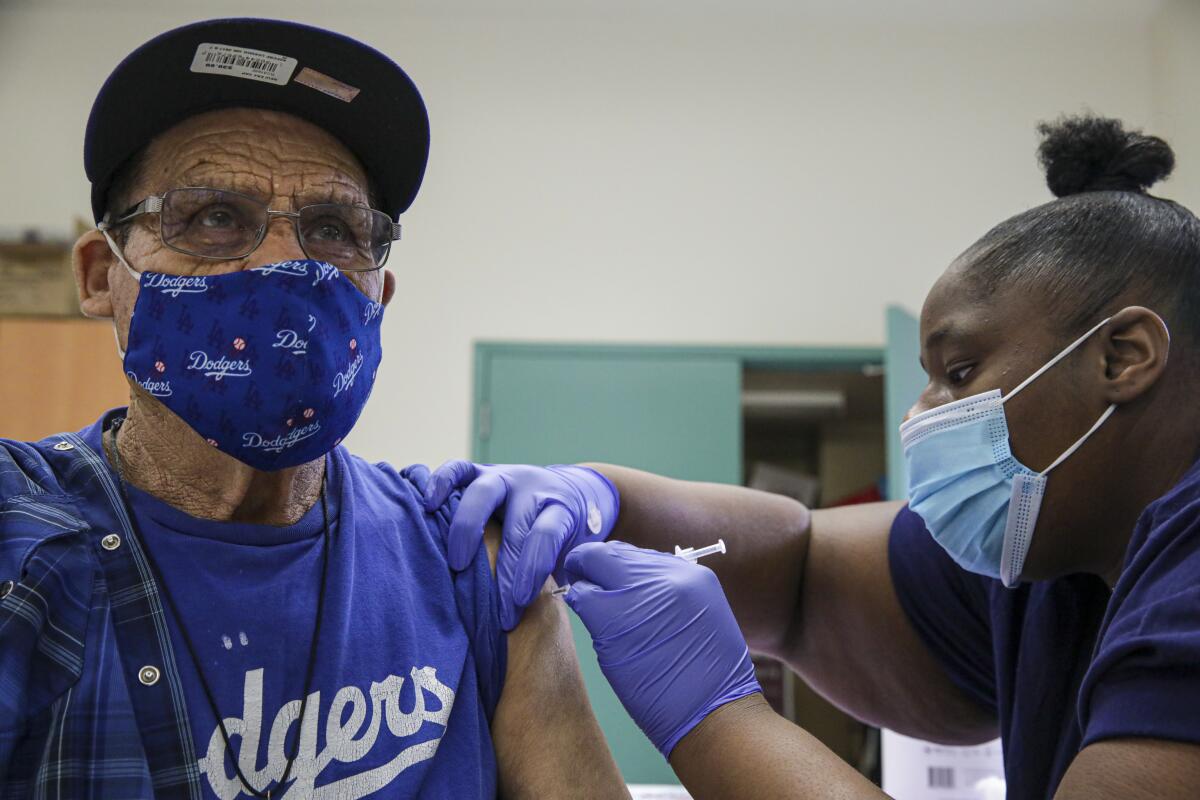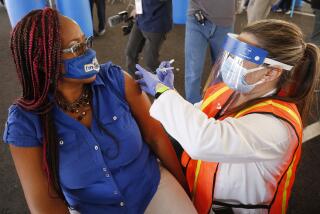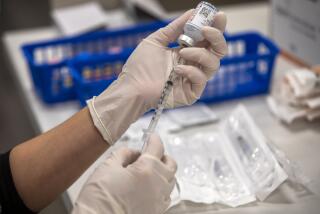In a major milestone, more than 50% of California residents have gotten a COVID-19 shot

- Share via
California has achieved a milestone in its five-month-long vaccination campaign: More than 50% of residents have received at least one dose of the COVID-19 vaccine, according to a Los Angeles Times analysis.
Today, roughly 19.6 million Californians have received at least one injection. Overall, about 38% of California residents are fully vaccinated, meaning they have received either both shots of the Pfizer or Moderna vaccines, or the single-dose Johnson & Johnson vaccine.
After an initially slow rollout, California has gained steady ground when it comes to administering vaccinations. California ranks 12th among all states in the nation for having the greatest percentage of its residents vaccinated with at least one dose, according to the U.S. Centers for Disease Control and Prevention.
The New England states of Maine, New Hampshire, Vermont, Massachusetts, Connecticut and Rhode Island, as well as New Jersey, have been able to vaccinate their residents the fastest nationwide. States that are still struggling include Louisiana, Mississippi and Alabama.
California’s pace of vaccination has improved since the first vaccine dose in the state was administered exactly five months ago in the arm of Helen Cordova, an ICU nurse at Kaiser Permanente Los Angeles Medical Center on Sunset Boulevard.
Seven weeks into the vaccination push, at the beginning of February, about 150,000 vaccine doses were being administered every day. By early April, California hit its fastest pace of vaccine administration — an average of 400,000 doses a day.
Since then, there has been a drop in the pace of vaccinations to roughly 250,000 doses per day.
To get more people vaccinated, officials in some parts of California are starting to shutter mass vaccination sites and devoting more resources to mobile and pop-up clinics that can offer easier access to the vaccine in some of the state’s hardest-hit neighborhoods.
Health officers are hoping that vaccination rates won’t continue to fall too quickly, and they announced this week that adolescents age 12 to 15 are now eligible for the Pfizer vaccine. They hope that could also spark renewed interest among older family members who remain unvaccinated. The shots are administered free to residents, without regard to insurance or immigration status.
Although mass vaccination sites at sports arenas and fairgrounds were set up in the early months of the response, those efforts may have missed some of the people who needed it most — those living in disadvantaged neighborhoods, those in crowded housing and those who needed to work outside the home.
“These large county vaccine sites were less effective in reaching residents in the hardest-hit communities,” said Dr. Paul Simon, chief science officer for the L.A. County Department of Public Health.
“Transportation and other access barriers at these sites may have contributed to some of the early inequities and vaccination rates in the county, necessitating additional efforts to target the hardest hit communities through neighborhood specific clinics and other focused approaches,” Simon said at a recent legislative hearing.
By contrast, wealthier people who worked from home had more success booking vaccine appointments online, and they had the free time and access to a car to travel long distances to get to vaccine sites.
This disparity can be seen throughout California.
In L.A. County alone, about 80% of residents in whiter and wealthier Westside Los Angeles neighborhoods such as Century City, Cheviot Hills and Playa Vista have been administered at least one dose. But in predominantly Black and Latino Los Angeles communities such as Watts, Westlake and Florence-Firestone — as well as in the cities of Compton and Lancaster — fewer than 40% of residents have been at least partially vaccinated.
Where you live can matter, too. Just 43% of people living in the most disadvantaged areas of California are at least partially vaccinated, while 63% of people living in the most prosperous areas have received at least one shot.
Statewide, only 34% of Latino and 35% of Black residents have received at least one dose of vaccine, compared to 50% of white, 47% of Native American and 61% of Asian American or Pacific Islander residents.
Officials have voiced optimism that rolling out robust mobile vaccination teams and pop-up clinic sites in hard-hit neighborhoods will help increase vaccination rates.
Yet, there can also be disparities within a racial group.
In the home of Silicon Valley, Santa Clara County, officials found that just 45% of Filipino Americans age 16 and older had received at least one dose of vaccine, while 59% of Chinese Americans, 64% of Indian Americans and 74% of Vietnamese Americans have been at least partially vaccinated.
Officials are also making efforts to encourage vaccinations among the youngest adults, who officials say have been especially prone to spreading the virus.
More to Read
Sign up for Essential California
The most important California stories and recommendations in your inbox every morning.
You may occasionally receive promotional content from the Los Angeles Times.











